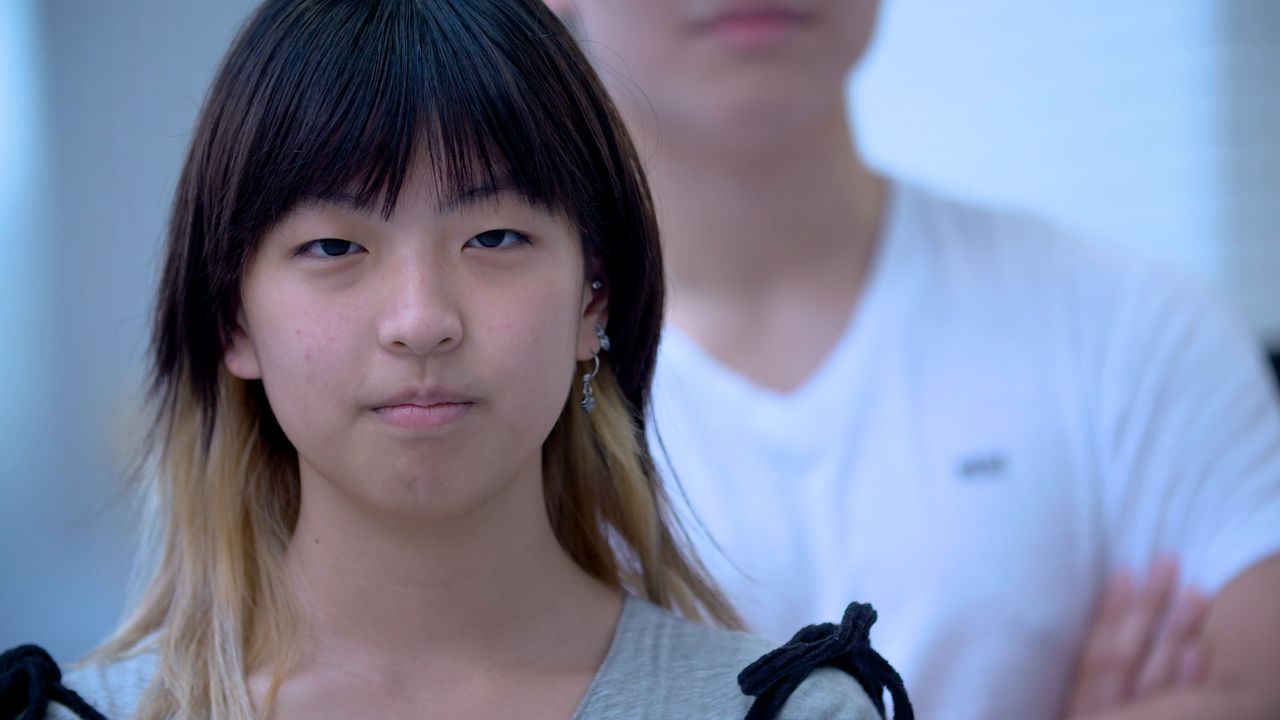
Energizing Japan’s Future: International Children’s Peace Prize Winner Kawasaki Rena
People Society Education Work- English
- 日本語
- 简体字
- 繁體字
- Français
- Español
- العربية
- Русский
Recognizing Inequality
Japanese youth activist Kawasaki Rena was just eight years old when she realized that she was better off than many of her peers in other countries. Growing up in a safe, prosperous country like Japan, she had freedoms and advantages others her age lacked. She attended a private international school where she learned to communicate effectively in English, a decision her parents made after their shared experience of struggling to express themselves while studying in the United States. But a book she came across in the school library brought her privileged existence into sharp relief.
The work was the photo collection Randoseru wa umi o koete (Randsels Across the Ocean), which documents volunteer efforts to send used randoseru, Japan’s ubiquitous school backpacks, to children in Afghanistan. Flipping through the pages of the photobook, Kawasaki came face to face with a starkly different reality from her own. There, in the desolate scenery of war-torn Afghanistan, children gleefully clutched the sturdy bags, which not only carried the students’ books and pencils but also doubled as desks in communities where the local schoolhouse had been destroyed in the fighting, enabling pupils to continue their education.
It occurred to Kawasaki that going to school was something she took for granted. “If I wake up and don’t feel like going to class, I can take the day off,” she says. “But here were children who faced a constant uphill struggle just to get an education. I couldn’t wrap my head around it.” The more she thought about it, the angrier she got.
Counting the advantages she enjoyed, she felt compelled to take some sort of action. She discussed ideas with her classmates, and together they made stationery items and postcards by hand to sell at the school’s culture festival, with the proceeds going to support refugees.
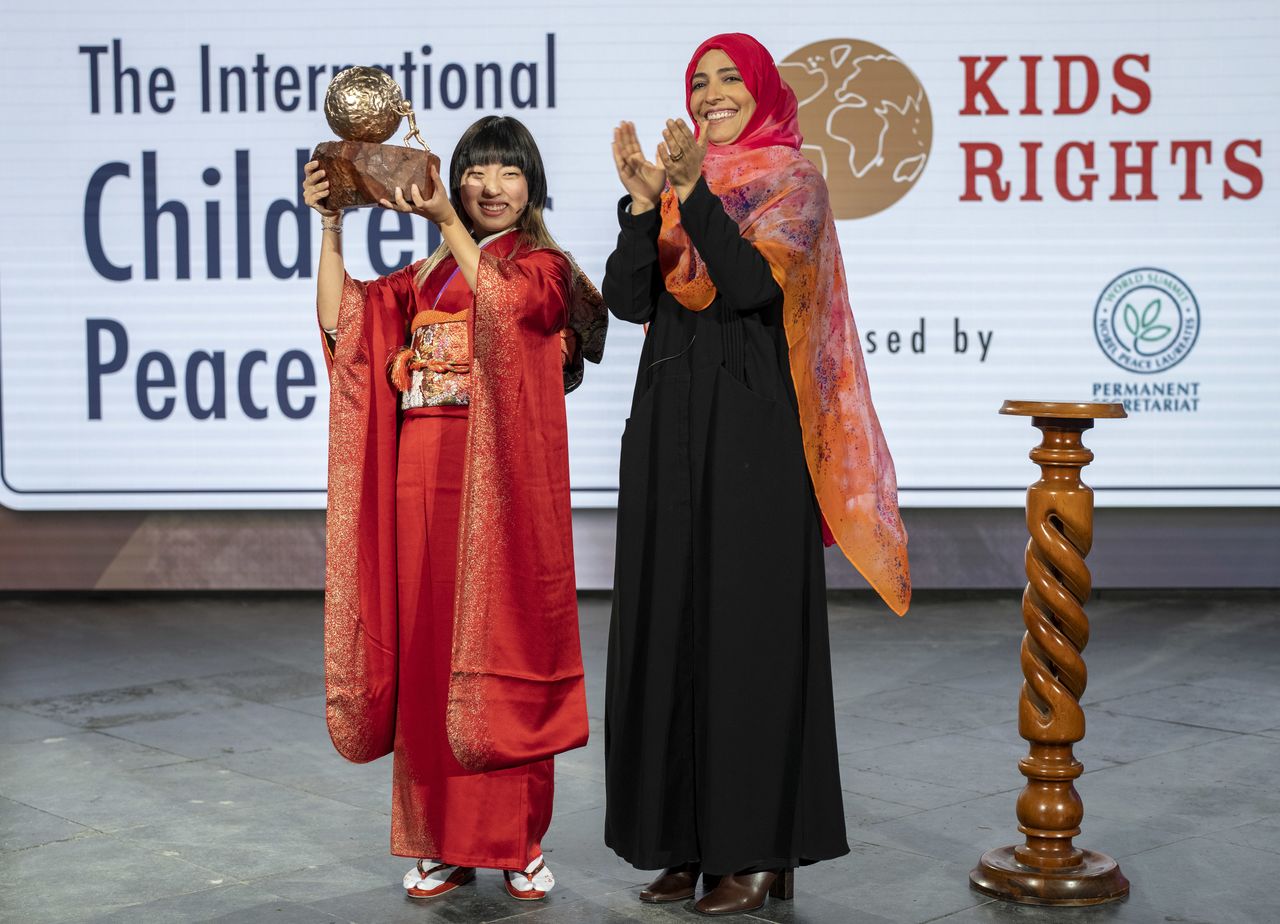
Kawasaki Rena, left, receives the International Children’s Peace Prize from Nobel Laureate Tawakkol Karman at a ceremony in The Hague, Netherlands, in November 2022. (© KidsRights 2022)
Making Connections
When the world closed down with the onset of the COVID-19 pandemic in 2020, Kawasaki, like so many others, found herself stuck at home. Her classes had moved online, and with more time to herself, she started to reevaluate her approach to activism. “I’d been involved in various projects for several years, but it felt like I’d hit a wall,” she recounts. Having grown up with the internet, she tapped into her savvy as a digital native to hunt for opportunities to broaden her horizons and make a greater impact on the issues important to her.
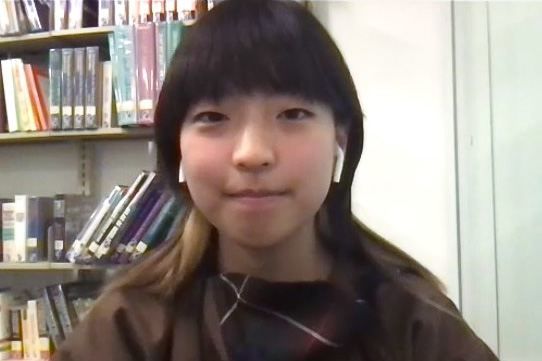
Kawasaki during her interview, conducted online. (© Nippon.com)
It was during this period that she came across an internship for university students at the US nonprofit environmental organization EarthX. Although still in junior high school, Kawasaki won acceptance to the program after sending a steady barrage of emails to the lead organizer, who was swayed by her determination. While serving as a moderator for an online event, she became acquainted with several regional directors of Earth Guardians, an international NGO that teaches youth about political action and activism. As a fellow member of Generation Z, Kawasaki shared her peers’ belief in the power of digital activism to foster change, leading her to start a regional branch of the organization.
Earth Guardians Japan today boasts some 50 members around the country, aged 11 to 18, whose activities include connecting young people and local political representatives via the online communication platform Zoom and conducting river cleanups in Osaka.
Diversity in Sustainability
Shortly after starting Earth Guardians Japan, Kawasaki was chosen to be chief future officer at Euglena, a biotech firm developing sustainable foodstuffs, biofuel, and other products. The firm had established the post in 2019 to ensure that the views of young people were reflected in the company’s operations. Kawasaki, the second person to serve in the post, was in charge of managing Euglena’s “Future Summit,” a meeting of five other youths chosen from among candidates for the CFO post.
Sustainability was the group’s central topic. Says Kawasaki, “Sustainability isn’t solely about tackling environmental issues. It’s also core to addressing social inequality so that no individual is left behind.” She points to the connection between the environment and physical and emotional wellbeing as an illustration, asserting that the summit helped highlight the importance of maintaining a broader perspective of the issue.
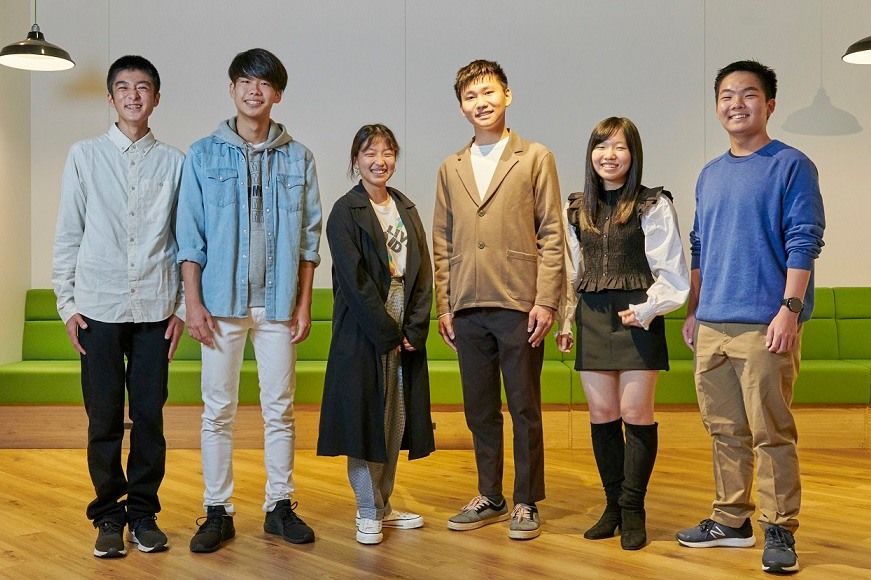
Kawasaki, center left, and other members of Euglena’s Future Summit. (Courtesy of Euglena)
Under the banner of “wellbeing innovation,” Kawasaki and her Future Summit colleagues proposed actions and objectives Euglena could adopt to improve sustainability. One such initiative was a series of inhouse workshops aimed at enhancing employee engagement as part of Euglena’s diversity and inclusion goals. “It’s vital to train new employees to be attentive and compassionate to others’ differences,” Kawasaki explains. With this in mind, she developed a new approach for fostering inter-office communication across different age groups and departments. Dubbed the “parents” system, it matches each new recruit with two current employees to encourage casual interaction without concern for differences in age and positions at the company. “The overall effect might be hard to quantify,” Kawasaki say, “but there’s definite potential to change office culture for the better.” Euglena adopted the program in March 2022.
Diversity in Public Education
Kawasaki attended a private international school during her nine years of compulsory education, freeing her from many of the strict regulations that many of her peers are subject to. For part of the three months of each summer vacation, though, her parents sent her to a local public school, allowing her to experience a typical Japanese education environment first hand. ”It was quite different from what I was used to,” she recalls. Typically sporting bleached hair and piercings, she had to dye her hair black and remove her jewelry. Despite these and other strictures, she maintains that attending public schooling was fun. “I was able to make friends with other kids in the neighborhood and learned to appreciate the quality of the public education system.”
In 2021, Kawasaki used her experience to create a short documentary highlighting the pros and cons of education in Japan, which she submitted to an international youth film and art initiative. Based on interviews with students and teachers at public and private institutes, the work looks at how people in the school system view education. While interviewees largely lauded the level of education at public schools, many also derided the system for subjecting pupils to unreasonable rules aimed at enforcing conformity at the cost of diversity.
For her part, Kawasaki says that in certain regards, public schools are more diverse than the international school she attends. “Most of my classmates are from well-off families,” she says. “We cover social issues like child poverty in class, but they don’t really resonate.” By contrast, there were children from single-parent families at the public school she went to who relied on school lunches to get something to eat. However, Kawasaki says that such disadvantaged students had little opportunity to gain a broader awareness of their situation.
To get at the crux of pressing social issues, Kawasaki believes that it is those students directly impacted by economic disparity along with their peers who are best situated to bring attention to the causes and offer solutions. But she stresses that more focus needs to be place on raising awareness. “Classes need to delve into the issues directly affecting students from the standpoint of finding solutions,” she declares. “It’s one thing to be critical of the current state of affairs, but it’s just as important to teach students to recognize what’s working and try to continue improving the situation.”
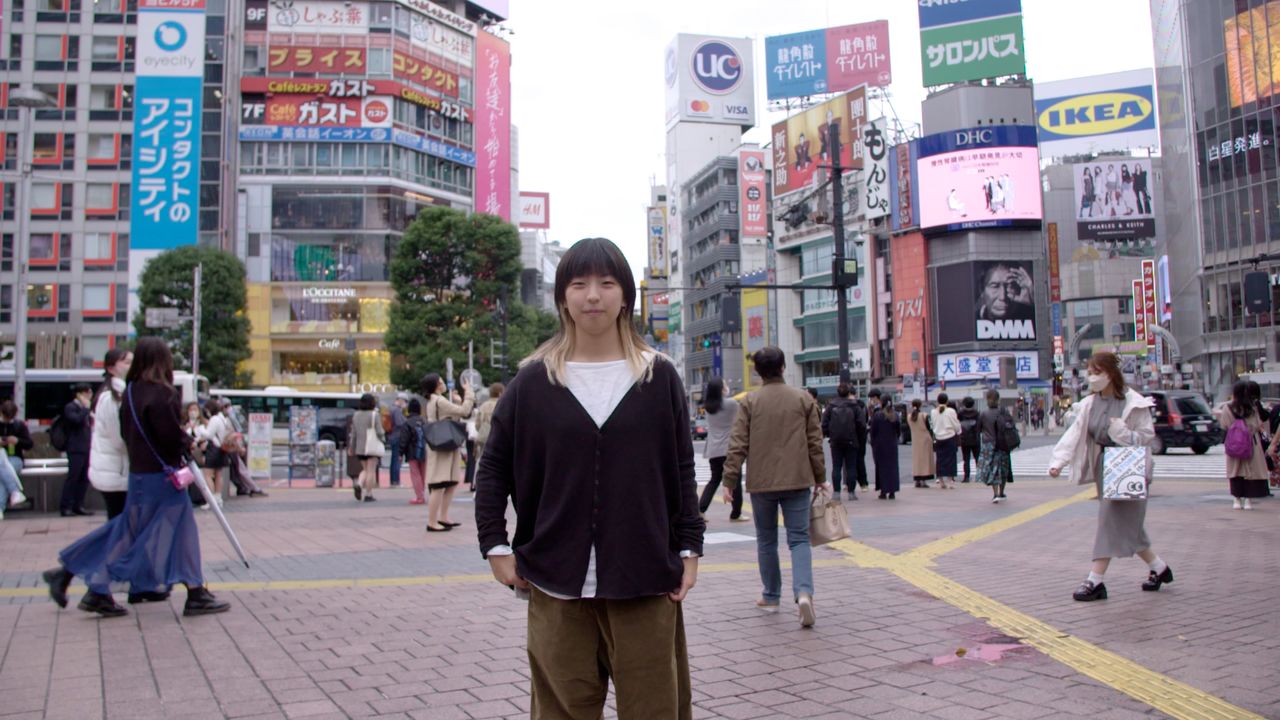
Kawasaki outside Shibuya Station, near the iconic scramble crossing. (© KidsRights 2022)
Political Apathy
In her acceptance speech for the International Children’s Peace Prize, Kawasaki cited her discontent at being unable to feel pride in her country as the impetus for her activism. As a voice for the younger generation, she wants to express the displeasure she and other digital natives feel at the current state of affairs. “There’s a lot of anger and mistrust,” she declares, feelings she attributes to having grown up watching a political system that outwardly appears broken. “There’s a lot of negative news online that has eroded our trust in politics—political scandals, images of legislators dozing in the middle of debates, and the like. So of course we’re pissed off.”
Apathy is often pointed to as the cause of the low turnout rate among young voters in Japan. However, Kawasaki says the situation stems less from young people’s outright indifference to politics than to the belief that voting is fruitless, as the system does not work in their favor.
In an attempt to bolster youth civic participation, Kawasaki created an online platform through Earth Guardians Japan to connect young people in her native Osaka and elsewhere with local political representatives via virtual meetings. Working with municipal and prefectural legislators gave her a new perspective on elected officials, who welcomed the opportunity to hear the views of young constituents. “I came away feeling confident that politicians from all parties take their responsibilities very seriously,” she says. This underscored for her the importance of sending a clear message to representatives that young people are concerned about government and social issues. For their part, representatives hailed the experience for opening their eyes to the issues on young people’s minds. “Only by engaging in dialogue can members of younger and older generation address their differences,” argues Kawasaki.
However, this means having the courage to openly share ideas and opinions that differ from those on the other side of an issue. “My activism has taught me that common ground can be found, no matter where you stand,” Kawasaki says. “The most important thing is to come up with as many constructive ideas as possible and then hash out which can actually get done.” She has learned that hope is more powerful than anger. “It’s this belief that motivates me to keep working.”
Anticipation for the Future
After graduating from high school, Kawasaki plans to attend university overseas to study political science and sociology. “I want to continue focusing on social issues and increasing young people’s participation in government,” she says. Looking forward, she intends to put what she learns to work in the public sector, an ambition inspired by her previous involvement in government initiatives.
She participated in an infrastructure project aimed at building a sustainable city in the Tokyo Bay area and an initiative in Niihama in Aichi Prefecture to ensure that young people’s voices are incorporated in governmental decisions. While taking part, Kawasaki was deeply impressed by the energy and commitment of the civil servants she worked with, people she describes as “being on the front lines of government policy and citizen engagement.”
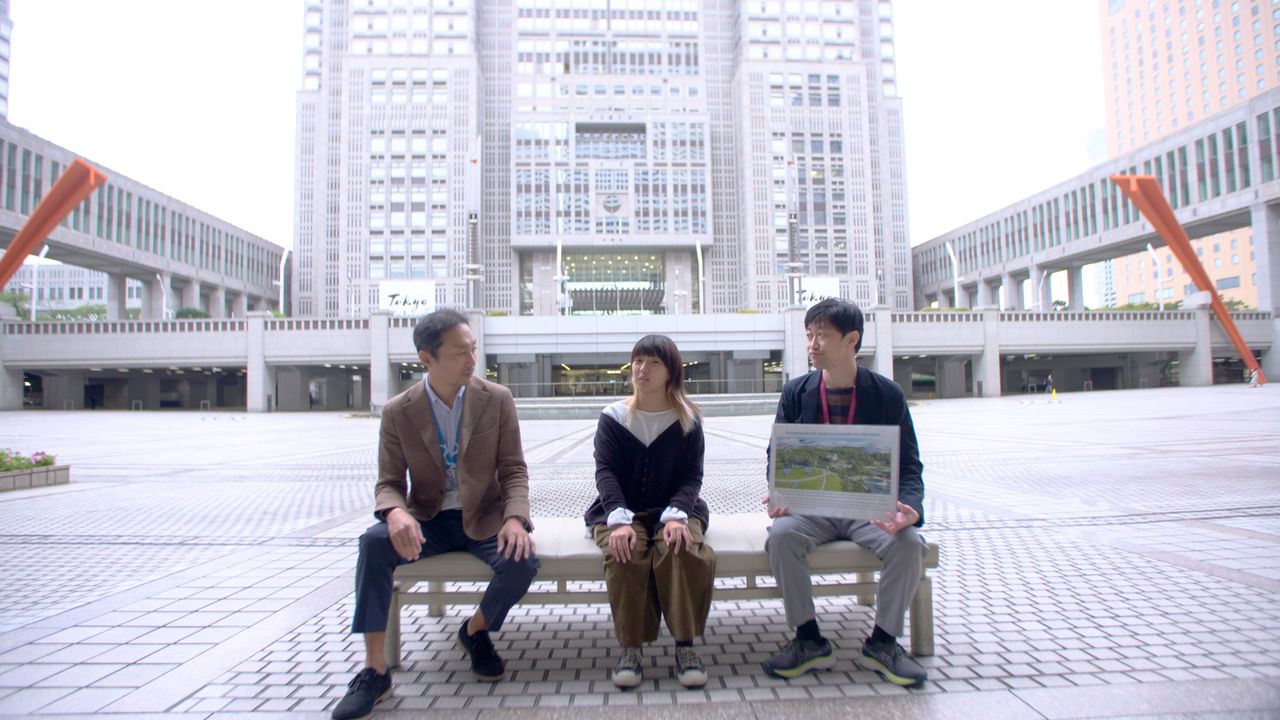
Kawasaki, center, discusses her involvement in the Tokyo Bay Environmental Social Governance infrastructure project outside the Tokyo Metropolitan Government headquarters in Shinjuku. (© KidsRights 2022)
Looking ahead, Kawasaki wants to focus her energy on changing how local government operates. “First and foremost, I want to support women, young people, and minorities in their efforts to be better represented at the local level,” she says. She notes that her previous feelings of discontent have gradually been displaced by ones of excitement and anticipation. “I’m eager to keep working for change.”
(Originally published in Japanese by Kimie Itakura of Nippon.com. Banner photo © KidsRights 2022.)